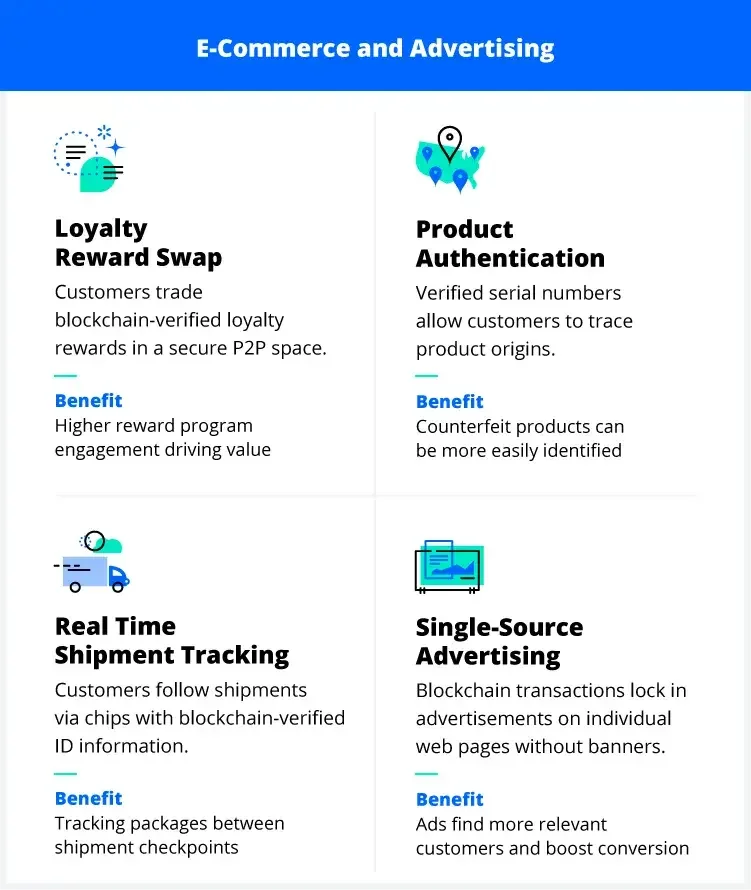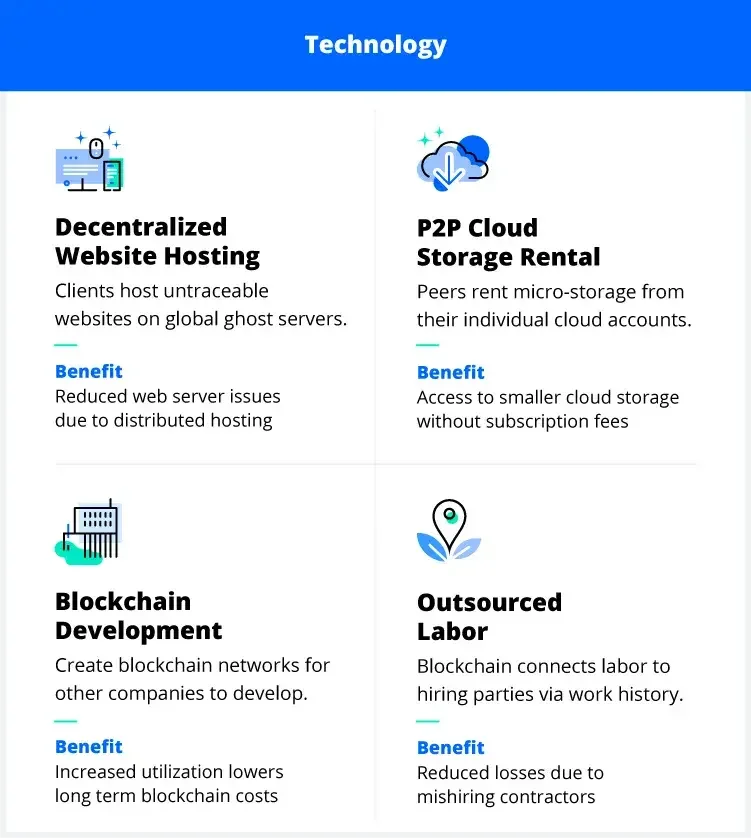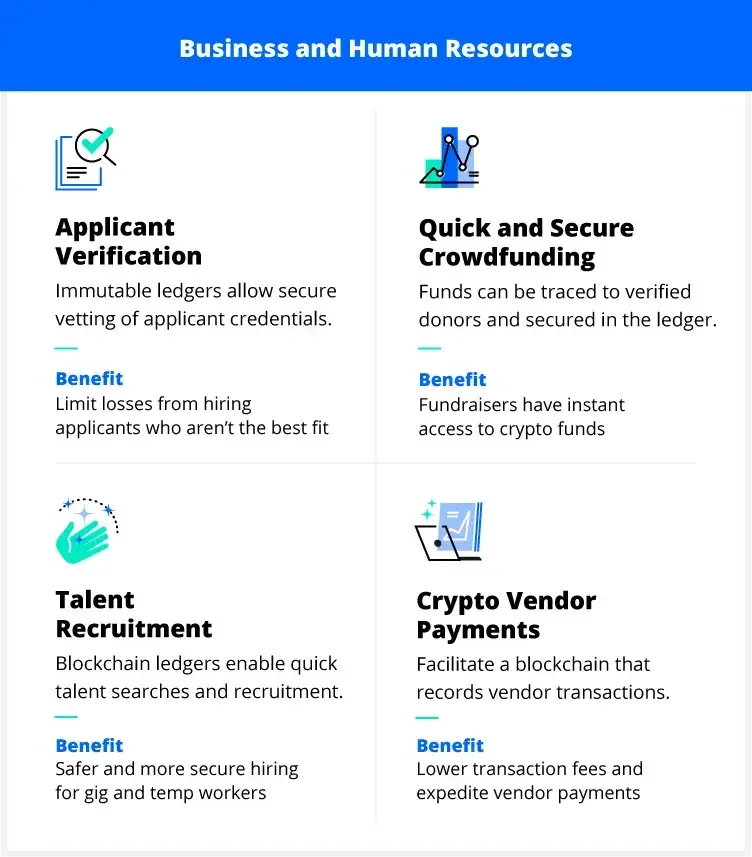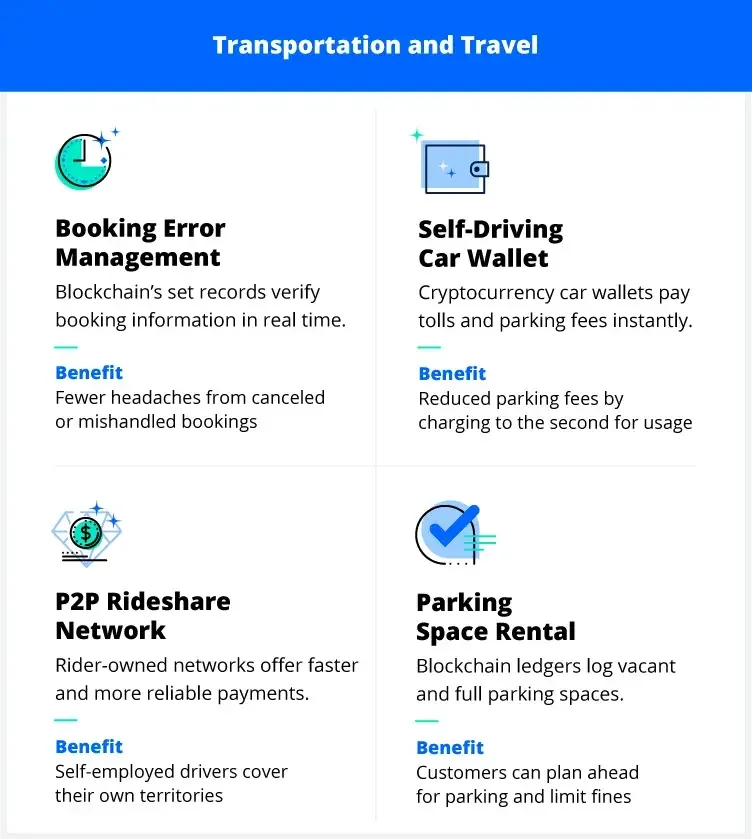Blockchain technology is everywhere, it seems. New cryptocurrencies are taking the Internet by storm, and it's likely that you know several people in your circle who already invest in crypto. You might even be wondering how blockchain technology can apply to other industries besides currency and investing.
Blockchain is a decentralized network of “nodes" (anonymous servers around the world) that connect transactions. These transactions are linked in a chain, or ledger, that's verified by those nodes automatically. This process is complex and tamper-proof; a verified transaction is recorded by countless nodes across the globe that timestamp it.

This means that blockchain transactions can never be faked or altered, making the technology a secure foundation to build a business on. The 31 examples below are real-world blockchain applications in e-commerce, healthcare, finance, and more to help inspire you to launch a blockchain business with a defined market in mind. You can also view the infographic below for more information on blockchain businesses and industry applications.
E-commerce blockchain businesses ideas
Technology and e-commerce both use patterns to forecast trends and plan ahead. Blockchain records an immutable ledger of data that can shape and predict trends more accurately than humans can, making it an ideal technology for the world of e-commerce and advertising.

Check out these blockchain business ideas to explore how a distributed ledger can help you grow an e-commerce or advertising-adjacent business.
1. Monitor and grow customer loyalty
Brand loyalty is a competitive game. Customers have more options than ever and can access them instantly. Brands that harness customer spending data to influence marketing campaigns are always looking for innovative ways to speak directly to their most loyal customers.
Blockchain-based customer loyalty companies use artificial intelligence (AI) to analyze spending patterns and target high-value customers with specific incentives. Retail, food service, and other industries have an incentive to hire these companies to gain a competitive advantage.
- Example: Momentum
2. Exchange loyalty rewards
Savvy customers know how to manipulate brand loyalty programs (for example, opening a credit card account to score a reward, then closing the account after terms are met). That means companies don't always connect with their most eager customers via reward programs; blockchain can help target these customers more easily.
Loyalty reward management programs have buy-in from brands so customers can trade their rewards among each other. This business facilitates peer-to-peer transactions with reward programs from different companies and even different industries. As long as the blockchain can verify its validity, it can be traded.
- Example: Loyyal
3. Trade online advertising space
AI is popular in advertising to forecast consumer preferences. Acting on those preferences can be difficult for a company if it doesn't have access to the right advertising space.
A blockchain company that uses AI to determine the best advertising space instantly records a transaction to purchase that space. Better yet, AI can work within a blockchain to trade advertising space between clients in the event of a new product launch or an unforeseen need.
- Example: Thrive
4. Sell targeted, single-source advertising
Some companies don't have the budget to cast a wide advertising net and instead need to focus on a smaller market. Single-source advertising eliminates the need for annoying banner ads while keeping a specific audience in mind.
Some advertising companies use AI to find pages where target audiences are likely to spend lots of time, like the comment section of particular news or opinion outlets, for example. Then, via blockchain, the company secures advertising space on those select few pages. This decreases advertising costs for clients and increases their chances of converting customers.
- Example: Squawk-It
5. Verify luxury goods
Blockchain's unchangeable nature makes it a perfect verification tool for luxury goods, art, and more. A blockchain authentication business works with manufacturer-provided data to record product production dates, times, and serial numbers. Customers could use this service to verify that their goods are legitimate.
- Example: Provenance
6. Track Shipments in Real-Time
It used to be difficult to keep track of a shipment's exact location between shipping facilities. Blockchain networks use nodes to automatically ping your shipment and receive real-time updates on its location. Blockchain shipment tracking businesses monitor this information and allow customers to track their shipments on-demand.
- Example: XYO Network
7. Protect valuables with a digital identity
Digital identities are unique codes assigned to objects or goods to ensure their tie to an owner. Blockchain identity businesses create and assign digital identities to items. This allows individuals to assign their own unique IDs to any item to prove their ownership as long as they have access to the serial number, VIN, or another identification metric.
- Example: VTT
Inspirations for IT blockchain businesses
Blockchain decentralizes activity away from a single server, meaning information doesn't live in a single location and is harder to hack or steal. This makes blockchain technology ideal for IT applications, like the business examples below.

8. Sell decentralized cloud storage
Cloud storage is a major improvement over traditional hardware-bound storage, but the information is still stored in a centralized server somewhere that could potentially crash or go offline.
Decentralized cloud storage uses blockchain to verify and protect information by scattering it across the globe. This reduces strain on individual servers and ensures customer information is inaccessible to anyone but them.
- Example: Sinovate
9. Rent cloud storage peer-to-peer
Since blockchain storage reduces strain on individual servers by spreading information across the globe, individual servers have the capacity to host “pieces" of information. A blockchain storage rental company connects users to a peer-to-peer network that allows them to rent a certain amount of their cloud storage space.
Peer-to-peer storage connects users who either have storage space to rent or only need a small amount of storage space to use. This allows renters to set their own prices while the rental business handles the interaction.
- Example: Storj
10. Outsource IT work
Traditional IT outsourcing involves copious setup, preparation, and relationship management to ensure expectations are met. By using collaborators through a verified blockchain network, companies have a detailed record of work history that can be verified instantly.
This setup is similar to other IT outsourcing enterprises but allows companies to more thoroughly vet the IT centers they outsource to. This extra insight eliminates misaligned objectives and ensures both parties are on the same page.
- Example: TP&P
11. Host decentralized websites
Websites are hosted on servers that are capable of crashing or otherwise not working. The decentralized component of blockchain means that information is spread over countless “ghost" servers (meaning they're untraceable).
With no central server that can crash and render a site inaccessible, blockchain can be a lucrative option for hosting websites.
- Example: Zeronet
12. Create blockchain systems for other companies
Blockchain development is complicated for new adopters of the technology. A blockchain development company is essentially a network of developers that specialize in blockchain technology to help other businesses adopt it.
- Example: SettleMint
Ideas for finance blockchain businesses
Blockchain was developed as a system for secure cryptocurrency transactions. Its applications across industries mirror these origins by using the same model of distributed ledgers linking different data.
Cryptocurrency's cultural prominence today means it's more possible than ever before to start a finance-focused blockchain business.
13. Recommend cryptocurrency investments
There are many ways to make a profit from trading crypto. All crypto trades are done through blockchain, meaning there's a permanent record of transactions to learn from. Cryptocurrency trading consultancy businesses offer recommendations based on these learnings to interested investors.
- Example: Safetrading
14. Host a cryptocurrency exchange network
Exchange networks for cryptocurrencies enable customers to trade internally through the platform. Blockchain's transparent nature means currency values are available in real-time for traders; this platform is ideal to couple with an investment consultancy to act as a one-stop-shop for curious investors.
- Example: Bisq
15. Facilitate cryptocurrency payment for vendors
Brands are increasingly more open to accepting cryptocurrency as payment for their goods and services (for example, Tesla will soon accept Bitcoin). However, doing so requires new infrastructure and learning. By facilitating cryptocurrency payments for companies, vendors, and customers, these middleman businesses provide a valuable service that expands operability for clients.
- Example: Payment21
16. Launch a digital wallet
Cryptocurrency is secure because it requires a dedicated key to access. With the right cybersecurity tools, digital wallets enable people to access their crypto assets at any time. There are even physical, offline storage drives for crypto that keeps currency secure and unhackable.
- Example: Trezor
17. Transfer Currency Around the Globe
Credit unions are popular for transferring money internationally, but they charge fees and often require a physical location for customers to collect funds. Transferring cryptocurrency across the world is lighting-fast and much less expensive because blockchain transactions happen instantaneously and often automatically.
Platforms that transfer crypto can charge small transaction fees to make their services favorable over those of a larger financial institution (or a currency exchange network).
- Example: Ripple
18. Promote instantaneous peer-to-peer lending
By utilizing the same concept as a credit union transfer, blockchain enables you to host peer-to-peer transactions and money transfers. This means that individuals can borrow money through a platform from one or more international sources without complicated back-and-forth communications or costly foreign exchange fees.
- Example: Coindesk
19. Crowdfund With Crypto
Crowdfunding a small business isn't a new concept, but blockchain technology makes it more secure to source funds from others.
You could devise a crypto crowdfunding platform for a particular industry or niche that makes a small fee from each funding project. This allows fundraisers to access their money instantly with a coin exchange service.
- Example: Fundsurfer
20. Manage cryptocurrency estate funds
Estate planning is already a complex process, but your loved ones and even lawyers will have a tough time accessing crypto funds if you haven't given them access. Smart contracts can manage the asset transfer process without error in the event of an illness or death so that your funds are not lost forever.
- Example: MyWish
Healthcare blockchain business models
Confidentiality and security are crucial in the healthcare industry to protect doctor-patient relationships. Blockchain excels at both and has the potential to make medicine safer and more accessible for everyone. Read on for ideas on starting a game-changing healthcare blockchain company.
21. Help patients access medical records
It's not uncommon for patients to change doctors, but it is common for medical records to become lost or untraceable if not converted to digital documents. Blockchain is capable of securely storing patient medical records and making them accessible to any of the patient's physicians with granted permission.
Because blockchain is decentralized, patient records would be securely distributed across countless servers so the risk to their personal information is minimal (especially minimal compared to the risk of losing a paper trail).
- Example: Guardtime
22. Verify medication validity
The World Health Organization estimates that one-tenth of medications in developing countries are counterfeit or not up to standard. Blockchain as a means of monitoring supply chains can help validate the authenticity of medications.
Verification companies use blockchain nodes to authenticate steps in the production process and assign a digital identity to each medication that can't be copied or faked.
- Example: Blockverify
Ideas for blockchain businesses in human resources
Blockchain has an inherent structure that makes it suitable for adoption by human resource departments and firms. Tracking applicant history, monitoring employee progress, and making hiring more efficient are all reasons that large corporations would want to hire blockchain specialists.

When mulling over business ideas, think about implementing these HR blockchain solutions to solve big problems for bigger businesses.
23. Authenticate hiring credentials
Blockchain's immutable nature means it permanently records data in a linked chain. Some blockchain businesses provide value to HR departments across industries by using blockchain to verify the hiring credentials of employees: their diplomas and education, skill background, work history, and more.
These credentials are only be visible once the employee grants permission in order to safeguard their personal data.
- Example: EKO/EchoLink
24. Connect certified gig workers to jobs
Building on the technology mentioned above, workers in the gig economy can benefit from blockchain tech to discover new job opportunities. With their credentials and certifications linked in an immutable chain, companies can connect with workers that best fit their hiring needs.
A blockchain company for gig workers promotes stability in an industry known to exploit workers. This is because the unchangeable ledger can automatically authorize payment as soon as work meets contract specifications without requiring sign-off from another party.
- Example: Telos
Blockchain business ideas for the travel and transportation industries
Since blockchain updates users in real-time all the time, the technology is well-suited for the fast-paced transportation industry. These blockchain business ideas explore concepts of connected travel and transportation that make both more efficient for users.

25. Manage hotel vacancy errors
Hotel room marketplaces flood consumers with available options. While this sometimes allows travelers to secure a low price on a room, it may result in booking discrepancies.
Blockchain booking businesses allow hotels and travelers to verify booking information in real-time. This reduces booking errors and avoidable cancellations, satisfying both parties at once.
- Example: Rezchain
26. Rent parking spaces
Public parking is often a hassle no matter where you are. Spots are limited and costs are often sky-high. To solve this problem for consumers, blockchain parking networks allow people, businesses, and even cities to list their parking spaces for rent. Blockchain technology ensures that booking data is accurate and unchangeable so parking tickets become a relic of the past.
- Example: Parkgene
27. Create a wallet for self-driving vehicles
Autonomous (self-driving) vehicles will force us to rethink several common aspects of driving a car. One of these considerations is how to pay for parking if you're not driving the car or even in the vehicle when it parks itself. Blockchain permits the ownership of digital wallets by nonhuman objects like cars and houses.
Using this technology, autonomous vehicles have car wallets that users can preload with cryptocurrency. When leaving a parking space, the car authorizes payment for the exact amount of time that it held a space. This ensures accurate parking fees down to the second.
- Example: Car Wallet
28. Cover peer-to-peer rideshare gaps
Rideshare is a valuable convenience for many Americans, but rideshare companies don't operate in every city in the country. Where these companies don't operate, consumers face limited transit options. Blockchain rideshare businesses connect riders to independent drivers immediately, without the need for an established rideshare network.
Drivers are able to accept payment directly with cryptocurrencies (or any other tender they prefer), avoiding city and state regulations restricting other rideshare companies from market entry. Drivers can also communicate vacancies in their cars more accurately for shared rides.
- Example: Arcade City
29. Make rideshares safer and more efficient
Rideshare can be exploitative to drivers who work long hours and still pay self-employment taxes on their earnings. Some companies strategize that using blockchain to empower community-owned rideshare networks will give more power and freedom to drivers.
These businesses operate as cooperatives with member buy-in from riders and drivers. A blockchain keeps dedicated records on both parties to ensure transparency for driving records and past ride reviews.
- Example: Eva
Entertainment industry blockchain business ideas
The entertainment industry is always changing, but blockchain might be the biggest shake-up to entertainment since live television. The technology's transparency and immediacy give more power to consumers, which means they're able to make more informed decisions about what to consume.
These blockchain entertainment business ideas propose radical solutions to established business models. Use them for inspiration to create the next big idea.
30. Distribute bitcoin vending machines
Bitcoin vending machines already exist as safer, smaller alternatives to traditional vending machines. These units don't have to process cash or dispense change, so they are considerably more compact.
The machines are also completely contactless, so concert and game attendees in packed arenas can feel safer about grabbing their favorite snack—and leave cash behind.
- Example: Aeguana
31. Launch an anti-subscription service
Micropayments are fragments of payments for traditional subscription services. Think of this concept as paying to watch one football game instead of paying for an entire season, or purchasing access to a single episode of your favorite show instead of a new network subscription.
Micropayments provide a solution to the oversaturated subscription market, so setting up a micropayment channel is one way to capitalize on this need.
- Example: uRaiden
Blockchain adoption is growing quickly and is expected to expand tenfold in the next five years. Forming a business around blockchain can position you as a cutting-edge player in a crowded market. The technology's security and reliability are prime factors driving its growth, and great reasons to get in on the action.


